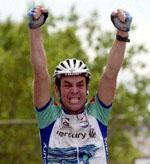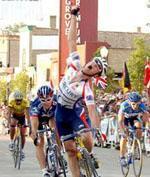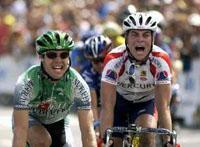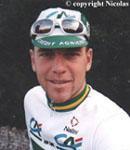
Recently on Cyclingnews.com |
An interview with Henk Vogels - Part I
Come fly with me
By Anthony Tan
 |
Every time Aussie hard-man Henk Vogels watches Paris-Roubaix from his home in Boulder it hurts. A lot. The overall winner of the 2002 Pro Cycling Tour was awfully close to winning the Hell of the North on two occassions, and became one of GAN's most valuable Classics riders in the mid to late nineties. That was before a knee injury followed by a "very sub-standard" offer resulted in a move to the US - with a promising team named Mercury. And most of us know about that story[1].
In the first part of this interview, Vogels (the Dutch name for birds) chirps to Cyclingnews' Anthony Tan about his thoughts on the upcoming World Road Championships in Zolder, his best season ever in the States, racing in Europe versus the US, and his decision to leave Credit Agricole.
Cyclingnews: It's quite the team for the World Championship road race in Zolder [Baden Cooke (Fdjeux.com), Nick Gates (Wiesenhof Leipzig), Matt Hayman (Rabobank), Robert McEwen (Lotto Adecco), Brad McGee (FDJeux.com), Stuart O'Grady (Crédit Agricole), Nathan O'Neill (Ceramiche Panaria), Michael Rogers (Mapei-Quickstep), Matt White (US Postal), Matt Wilson (Fdjeux.com) and Henk Vogels (Mercury)]. How's you preparation going?
Henk Vogels: To tell you the truth my preparation hasn't been ample. The US season is pretty much wrapped up after the Miami Classic last week, so I'm at a little bit of a disadvantage; the riders in Europe also have longer races such Paris Tours, Paris Bourges, Franco-Belge and Paris Correze. My preparation was the Tour of Bermuda, San Francisco and Miami - three one-day races which are pretty big, but they're still small races in comparison to Europe.
My form's not 100 percent, but it's a flat course so that's great for me. I'm really, really not sure how things are going to happen over there - I could have a great day and pull something big, but the other guys could be at another level. I'm sort of up in arms about how things are going to go.
Hendricus (Henk) Vogels Date of Birth: 31/07/1973 Major Results2002 Mercury 1st Overall, USPRO Cycling Tour 2001 Mercury-Viatel 1st GP Cycliste de Beauce 2000 Mercury 1st First Union USPRO Road Championships 1998 GAN 7th Amsterdam RAI Derny Race 1997 GAN Australian Cyclist of the Year (Sir Hubert Opperman Trophy) 1994 Australian Institute of Sport 1st GC, Tour of Holland 1991 Australian Institute of Sport 3rd World Junior Championships 4000m Teams Pursuit |
CN: Cycling Australia made the announcement a few days ago. Did you know you were going to be selected before then?
“knowing Belgium in October, I think it's going to be echelon after echelon, crosswinds and probably rain at 45 degrees” |
HV: I'd been in contact with Neil Stephens [Cycling Australia coordinator for pro riders] and he'd shown some interest in me. I think my second in San Francisco in a quality field, against riders like Ekimov, [George] Hincapie, Lance Armstrong and the Acqua e Sapone team was what sealed it. I think just on that race, they [the selectors] probably thought: "This guys on pretty good form, let's take him." I haven't done any races in Europe, but I dominated in the States; they know how I'd go on this type of course, so I was pretty confident of being selected.
CN: Have you had a chance to have a look at the parcours? The media have been saying the Zolder circuit is a course tailor-made for sprinters. What are your thoughts on this?
HV: I haven't seen anything on the course so far, but I know it's a flat course. I spoke to Nick Gates today and he told me that on the climb, you could probably ride 53x15 no problem; so it's definitely a "rouleurs" course - big gear, power guy. I actually don't think it's going to be a bunch sprint - knowing Belgium in October, I think it's going to be echelon after echelon, crosswinds and probably rain at 45 degrees. I don't believe there will be any one team that can control the World Championships, and in the last couple of years, no team really has. So personally I don't think it's going to be totally up to the sprinters - I think it's going to be full-on, 60 kilometres an hour all day, attack after attack.
CN: Besides the nice big paycheck, how does it feel to have finished at the top of the leaderboard in the Pro Cycling Tour (PCT)? Was it a specific goal of yours at the start of the season, or did it become a goal as the season progressed?
 |
HV: I had a great year in 2000, then in 2001 I was sick for three and a half months and I never really got to show the world what I could do. So to come back this year and to be rated the best rider in the Pro Tour has been great for my confidence.
I was totally not thinking about the overall in the Pro Tour - my goal for my team was to be as best as I could in races like Philadelphia, San Francisco, New York and the First Union Week - where the television coverage is on par with NFL [National Football League] and the biggest baseball matches. For a team like Mercury they want as much airtime as possible, so my goal was to on my best form in those major one-day races, which are the bread and butter for US cycling.
That's what they pay me to do over here - to come up big in those races - I was just the most consistent out of any US cyclist in those major events. Just to be up for the win was enough for me to win the Pro Tour - some guys were good for two months and not so good for the rest, whereas I was good for the whole year. It was a good season for me and I'm really happy with how things went.
CN: What sort of preparation do you go through in the weeks leading up to an event such as the San Francisco Grand Prix, where it is substantially different to the other PCT events held on much flatter circuits?
“I took it onto myself to show people that I can also win a National Championship event in a sprint finish” |
HV: There were 180 guys there, and I came to a finish with seven guys. It was a 38x27 climb, so we're talking minimum 18% average, up to 22%. A short, sharp 1.5 kilometre climb is something I can do very well at - the training and the racing I was doing was simulating that somewhat, but it's pretty much all about the power aspect. I think of myself as somebody who is very good on that type of circuit; those circuits where you're using a 39x23 and it's two to three minutes of pain is what I like and are suited more towards me - that's my forte.
CN: You also won the USPRO Crit Champs with some aggressive riding in a very competitive field. Do you rate the win up there with your victory in the USPRO Road Champs in Philly two years ago?
HV: I would have to say that the USPRO Road Championship win was my biggest win here in the United States. It's 265 kilometres, and it's a more demanding event than a criterium. I lead Gord Fraser out for twenty wins a year, so when he crashed, I took it onto myself to show people that I can also win a National Championship event in a sprint finish.
The USPRO Crit win was a great result for me, a great result for Team Mercury and also a very personal victory, but the US championship in Philadelphia will always stick out in my mind as my best result in America. It's on par with a World Cup event in my eyes because all the Americans are peaking for that event, and also it's the richest one-day cycling event in the world - so it's a cool thing to win that event.
CN: It's not hard to see that you've had your best season so far since moving to the US. Have you been doing anything differently compared to that of previous years in regards to your training or preparation?
HV: To tell you the truth, I think the main thing was that I've being a professional for some time now. I turned professional for Novell in 1995, so I've been a pro for eight years and I know how to bring myself up for races. I have been working with a new trainer this year, Rick Crawford - he's looked after me as far as my central nervous system goes and bringing me up for certain races.
CN: Speaking of racing in the US, you seem to have adapted really well to the style of racing in the States versus what you experienced in Europe when you were with Novell and GAN. What are the main differences in the style of racing between the two continents, and do you prefer one over the other?
 |
HV: These races out here are good for me; they're power races - with short, sharp climbs where a natural selection occurs. I wouldn't say I've changed my training, but rather I've directed it in different ways to peak for different events. But like I said, the racing over here has always suited me. I did well over in Europe too, but I made a decision to come to the US and become a player over here - so to be number one at the end of the year is a great result for me and I'm happy how everything went.
In Europe there's so much more depth. In America, there's 30-40 guys who out of 150 who could win; in Europe there's about 100 out of 180 guys who could win. The style of racing over here is more criterium based, more speed based - so less kilometres, but probably of the same intensity.
I really enjoyed my days over in Europe though. I would really love to get back into a team over there, and I still am trying to get back into a team over there. Every time I see the Classics I really get jealous that I'm not there because I did so well when I was racing between '96 - '99. I tried to come over here with a team that was very promising, and they ended up going Category 1, but it all fell through.
CN: Just on that, what made you change your mind to go to the US in the first place, because you really seemed to be in your element in Europe, especially in the Spring Classics like Paris-Roubaix?
HV: At the end of '98 I was out with a knee injury for two or three months, and I never really regained the form I had in the previous two years in '99. So I pretty much gave my role in my team to Stuart O'Grady to help him win the green jersey [in the Tour de France] that year.
I had some contractual offers from some US teams which were very interesting, and the team I was in, Credit Agricole, offered me a sub-standard offer. I have to say I got a little bit insulted by the offer I was given by Roger Legeay that year, and the team I was courted by [Mercury] was for good money and a good program, with the possibility of going to category one.
Part II of the interview with Henk Vogels: Vogels gets chirpy about living in Boulder, the US racing scene, that unique Aussie mentality - and (not) thinking about life after pro cycling
[1] Mercury's rollercoaster ride
- Oct 27, 2001: Cooke signs for Francaise des Jeux
- Late 2001: Floyd Landis talks about Mercury
- Sep 1, 2001: Verbruggen reacts to Mercury situation
- Aug 16, 2001: Koerts free to go
- Aug 11, 2001: Gallopin contests his sacking
- Aug 9, 2001: Alain Gallopin sacked , Mercury's European Assistant Director
- Jul 31, 2001: Mercury-Francaise des Jeux merger
- Jul 25, 2001: Mercury's end of season plans
- Jul 13, 2001: Peter Van Petegem looking for a new team
- Jul 2, 2001: Lammerts' last time in the driver's seat
- Mid 2001: Pavel Tonkov talks about Mercury
- Jun 30, 2001: Viatel separates from Mercury
- Jun 13, 2001: Mercury and Lemond part ways
- Jun 1, 2001: Laurent Chotard sacked from the Mercury-Viatel
- May 7, 2001: Mark Gorski (USPS) on Mercury's exclusion from the TDF
- May 3, 2001: Mercury excluded from Tour; reaction from Lemond
- Jan 18, 2001: First team change for Leon van Bon
- Dec 12, 2001: Van Petegem signs for Mercury
- Dec 6, 2000: Lemond joins Mercury
- Sep 10, 2000: Mercury announces 2001 line-up
- Sep 7, 2000: Mercury signs Jans Koerts and Leon Van Bon
- May 20, 2001: Mercury adds Manheim
- Jan 16, 2000: Thurlow Rogers captains Mercury
- Dec 19, 1999: Ti Sports Australia scores deal to build 150 team issue road frames plus 85 custom made (Fuji) frames for Mercury

